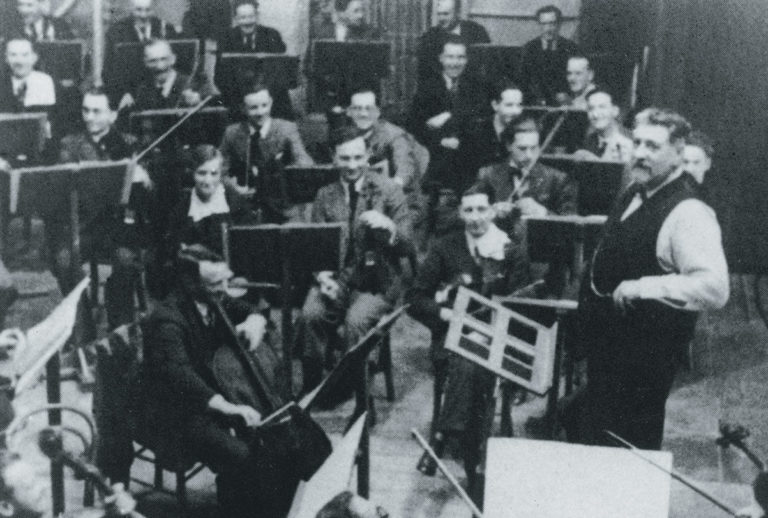In September 1919, the Musical Society established an Orchestral Society, an amateur string orchestra, which was supplemented as required by members of the Opera orchestra, military orchestras and later also the Radio Orchestra, as well as by conservatory students.
Such an orchestra could not, of course, replace a regular symphony orchestra, and so genuine symphonic concerts were rare during this time. However, the orchestra did have a strong influence on Ljubljana’s concert life, performing numerous works that the audience would otherwise have had no opportunity to hear.
Furthermore, many musicians started their careers in the orchestra, and ever more prominent Slovenian soloists appeared at the orchestra’s concerts.
After World War One, frequent appearances were made by the Military Band of the SHS, the orchestra of the Serbian Royal Guard and, in particular, by the military orchestra of the Drava Division, led by Dr Josip Čerin, an experienced musician who had graduated from the Vienna Conservatory with outstanding grades (1896) and was a distinguished music scholar, having received his doctorate under the mentorship of Dr Guido Adler at the University of Vienna in 1902.
The 1920s were a step back in comparison to the situation prior to the War. The Musician’s Association tried to revive the Slovenian Philharmonic at the start of 1923 and to introduce regular season tickets for symphonic concerts.
In 1934, the Ljubljana Philharmonic was founded, consisting mainly of members of the Opera Orchestra and the Orchestral SocietyThe Philharmonic invited many well known European conductors and soloists to perform with it (Lovro Matačić, Hermann Scherchen; Zlatko Baloković, Robert Soëtens, Rudolf Firkušny, Arthur Rubinstein, Jaroslav Kocian, Jan Kubelik, Gaspar Cassado, Alfred Cortot, Nikita Magaloff, Karel Reiner, Pančo Vladigerov, Aleksander Čerepnin, etc.).
In the archives of the Ljubljana Philharmonic there is a description of its formation, where we can read that the “conditions in the Slovenian capital are still such that a permanent Philharmonic could not exist if we were to wait for the financial resources from public authorities or cultural societies… This is why the Musician’s Association took the helm and the initiative…”
The Radio Orchestra, led by the excellent conductor Drago Mario Šijanec, also played an increasingly important role, performing regularly between 1935 and 1945.
The outbreak of war on 6 April 1941 again changed the situation with regard to the music on offer in Ljubljana. In addition to opera performances, numerous recitals, chamber concerts, and symphonic concerts again became a feature of musical life in occupied Ljubljana.
The Jutro newspaper wrote: “Following an initiative by members of the Radio and Opera orchestras, a special symphony orchestra has been founded that has taken on the task of giving a series of symphonic concerts with very interesting programmes under the auspices of the Musical Society. We warmly welcome this initiative from our generous musicians.”
This was the start of the symphony orchestra that bore the weight of the symphonic programme in wartime Ljubljana. Concerts were mainly held at the Union Hall and were often sold out, as audiences were hungry for musical entertainment at this time.
